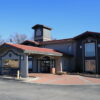By Emma Austin, Louisville Courier Journal
Leaders of Citizens of Louisville Organized and United Together said they’ve won a lot for their community, but there’s more work to do after more than 1,500 members met for a virtual gathering Tuesday night.
CLOUT held its annual “Nehemiah Action Assembly” to address key community issues and hear from public leaders, including JCPS Superintendent Marty Pollio and Louisville Metro Council President David James.
CLOUT is made up of religious congregations “working together to solve critical community problems.” Its mission, according to its website, is to “build the power of religious congregations to solve community problems by holding systems accountable.”
Every year, the organization picks issues to tackle in the community. The religious nonprofit’s campaigns this year are focused on police-community relations, affordable housing, school discipline and safety, and services for older adults.
Here is what leaders said about those issues at Tuesday’s assembly:
On police-community relations
The Rev. Reginald Barnes of Brown Memorial C.M.E. Church, co-chairperson of CLOUT Community Safety & Equity Research Committee, said the organization is proposing two solutions to address problems with police-community relations and public safety in Louisville.
One of those initiatives calls for establishment of an alternative to police response for people in crisis — a mobile unit of professionally trained public servants who could be dispatched to help Louisville residents with issues including mental illness, homelessness, domestic disputes and school behavior in place of police.
The initiative also would include a crisis stabilization center similar to the Living Room, which served as a resource for people with a substance abuse disorder or mental illness before being closed in 2019 due to city budget cuts.
The exact scope of those initiatives will be partly informed by research underway at the University of Louisville and the Commonwealth Institute of Kentucky, Barnes said.
“But based on all of the research that we’ve done as an organization, we are positive that their study will reveal the need of those services,” he added.
Barnes also described a “Truth and Transformation” initiative meant to build trust between Louisville residents and LMPD. He said the process would be similar to those used in other U.S. cities and other parts of the world, including South Africa’s post-apartheid “truth and reconciliation” process.
Barnes said CLOUT has met with Louisville Metro Police Chief Erika Shields and River City FOP President Ryan Nichols about its proposed solutions and invited them to Tuesday’s gathering, though neither showed up.
LMPD spokeswoman Beth Ruoff said Shields had been unable to accept the invitation to the meeting because of a previous engagement with Louisville’s Group Violence Intervention program.
Barnes called their absences “unacceptable” and turned his attention to Metro Council President David James, who told the organization’s members he would support work to create a mobile response team and crisis stabilization center as well as the “Truth and Transformation” process.
Speaking briefly to the hundreds of CLOUT members tuned into the virtual meeting, James said trust and legitimacy in law enforcement is one of Louisville’s “core issues.”
“All the public initiatives and public policy pieces that CLOUT has pushed in our city and the efforts that you made have made our city a better place, and I just want to say thank you,” said James, who is running for mayor in 2022.
On implementing restorative practice at JCPS
CLOUT has been working for eight years to get restorative practices implemented in all JCPS schools, and CLOUT Restorative Practice Committee Chairperson Karen Williams said the pandemic caused some setback in its progress.
Williams reminded members Tuesday that Superintendent Marty Pollio committed in 2019 to expanding the use of restorative practices in all 150-plus JCPS schools within six years and said he is still committed to that goal.
Restorative practice is a strategy to prevent misbehavior by building trust among students and authority and is meant to teach children how their actions affect others and let children right their own behavior.
The pandemic forced training at 20 JCPS schools to be postponed for a year, but in a video statement shared at the meeting, Pollio said JCPS has a plan to catch up and will fund restorative practice training at 30 schools this summer.
“Our goal — as quickly as possible — is to implement restorative practices in all of our elementary schools,” Pollio said. “We also are going to dedicate much of our CARES funding to support homeschool funding with restorative practices and make sure our students are supported with wraparound services.”
On affordable housing
The sole initiative to which CLOUT members did not receive a solid commitment from community leaders was in its affordable housing solution, which calls for $40 million be allocated to the Louisville Affordable Housing Trust Fund.
CLOUT officials say the trust fund sat virtually unfunded since it was founded in 2008 until the group pressed Metro Council. The trust received $2.5 million in 2016, $9.6 million in 2017, $10 million in 2018, $5 million in 2019 and $10 million in 2020, according to the nonprofit.
CLOUT leaders asked Metro Council members — including James and Councilman Bill Hollander, who spoke at the assembly — to quadruple the amount currently allocated to the fund, but neither said they would explicitly support sending that amount to the fund.
“What I will commit to is to use the best available funding sources and to increase the amount of money that we are spending to affordable housing,” Hollander said. “… We need to spend more money for our houseless individuals in this community too, and the trust fund may not be the best way to do that.”
On ‘Flourish Village’ model for older adults
CLOUT members also heard a progress report from leaders of the University of Louisville’s Trager Institute on its “Flourish Village,” a program in which members provide a support network for older adults.
The village will provide and coordinate services including transportation, social activities, home repairs and educational events meant to allow older adults to age in place rather than go to an assisted living facility.
CLOUT, the Trager Institute and Age-Friendly Louisville plan to launch their collaborative project “Flourish Village” this fall.
CLOUT Co-President Rev. Angela Johnson of Grace-Hope Presbyterian Church said after the assembly she was pleased with the meeting overall, especially regarding the Flourish Village update.
“It’s just going to be a big help for seniors,” she said. “They want to age in place; they don’t want to go to assisted living.”
View the original story here.






